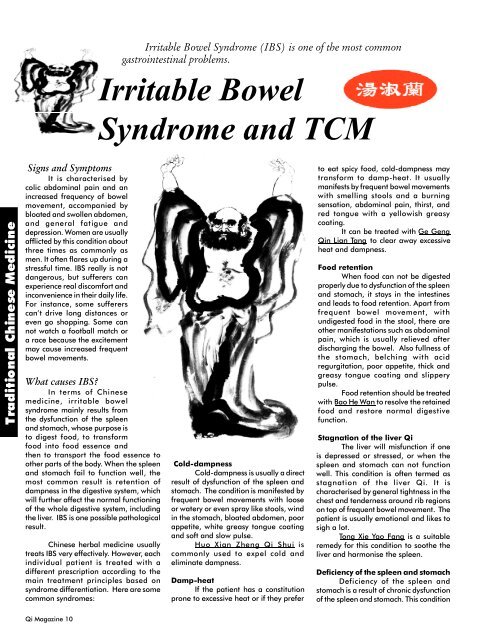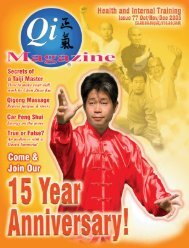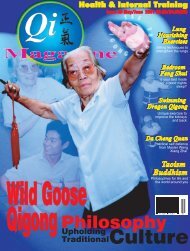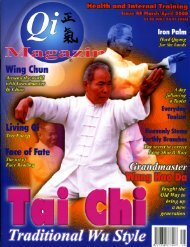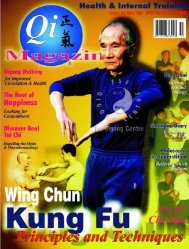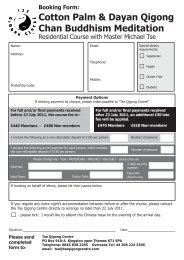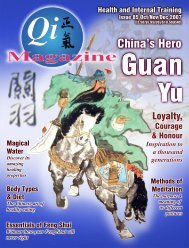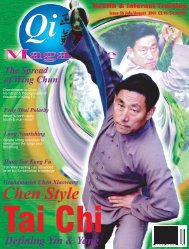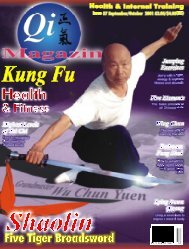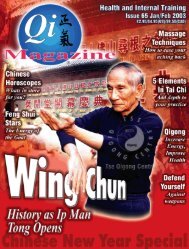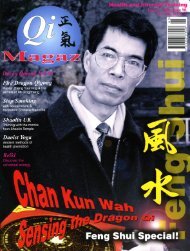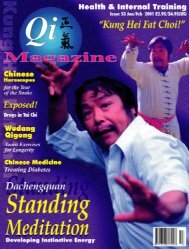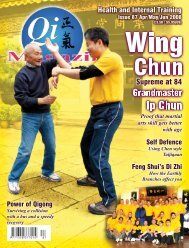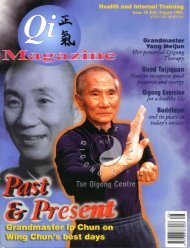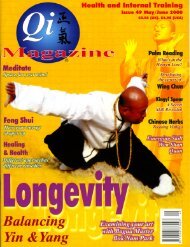You also want an ePaper? Increase the reach of your titles
YUMPU automatically turns print PDFs into web optimized ePapers that Google loves.
Irritable Bowel Syndrome (IBS) is one of the most commongastrointestinal problems.Irritable BowelSyndrome and TCMTraditional Chinese MedicineSigns and SymptomsIt is characterised bycolic abdominal pain and anincreased frequency of bowelmovement, accompanied bybloated and swollen abdomen,and general fatigue anddepression. Women are usuallyafflicted by this condition aboutthree times as commonly asmen. It often flares up during astressful time. IBS really is notdangerous, but sufferers canexperience real discomfort andinconvenience in their daily life.For instance, some suffererscan’t drive long distances oreven go shopping. Some cannot watch a football match ora race because the excitementmay cause increased frequentbowel movements.What causes IBS?In terms of Chinesemedicine, irritable bowelsyndrome mainly results fromthe dysfunction of the spleenand stomach, whose purpose isto digest food, to transformfood into food essence andthen to transport the food essence toother parts of the body. When the spleenand stomach fail to function well, themost common result is retention ofdampness in the digestive system, whichwill further affect the normal functioningof the whole digestive system, includingthe liver. IBS is one possible pathologicalresult.Chinese herbal medicine usuallytreats IBS very effectively. However, eachindividual patient is treated with adifferent prescription according to themain treatment principles based onsyndrome differentiation. Here are somecommon syndromes:Cold-dampnessCold-dampness is usually a directresult of dysfunction of the spleen andstomach. The condition is manifested byfrequent bowel movements with looseor watery or even spray like stools, windin the stomach, bloated abdomen, poorappetite, white greasy tongue coatingand soft and slow pulse.Huo Xian Zheng Qi Shui iscommonly used to expel cold andeliminate dampness.Damp-heatIf the patient has a constitutionprone to excessive heat or if they preferto eat spicy food, cold-dampness maytransform to damp-heat. It usuallymanifests by frequent bowel movementswith smelling stools and a burningsensation, abdominal pain, thirst, andred tongue with a yellowish greasycoating.It can be treated with Ge GengQin Lian Tang to clear away excessiveheat and dampness.Food retentionWhen food can not be digestedproperly due to dysfunction of the spleenand stomach, it stays in the intestinesand leads to food retention. Apart fromfrequent bowel movement, withundigested food in the stool, there areother manifestations such as abdominalpain, which is usually relieved afterdischarging the bowel. Also fullness ofthe stomach, belching with acidregurgitation, poor appetite, thick andgreasy tongue coating and slipperypulse.Food retention should be treatedwith Bao He Wan to resolve the retainedfood and restore normal digestivefunction.Stagnation of the liver QiThe liver will misfunction if oneis depressed or stressed, or when thespleen and stomach can not functionwell. This condition is often termed asstagnation of the liver Qi. It ischaracterised by general tightness in thechest and tenderness around rib regionson top of frequent bowel movement. Thepatient is usually emotional and likes tosigh a lot.Tong Xie Yao Fang is a suitableremedy for this condition to soothe theliver and harmonise the spleen.Deficiency of the spleen and stomachDeficiency of the spleen andstomach is a result of chronic dysfunctionof the spleen and stomach. This conditionQi Magazine 10


